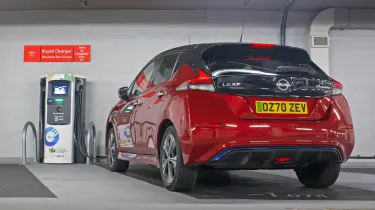
The government is set to announce a review of the controversial ZEV mandate after several major car manufacturers publicly expressed their concern over what has previously been described as a “hostile” business environment.
According to reports by PA Agency, Business Secretary Jonathan Reynolds is expected to make a speech at the annual Society of Motor Manufacturers and Traders dinner on Tuesday, setting forth plans for a consultation that could help non-compliant manufacturers avoid fines.
As it stands, the UK’s ZEV (zero-emissions vehicle) mandate, which was enacted at the beginning of 2024, requires that 22 per cent of vehicles sold by each manufacturer this year must be fully electric or have zero tailpipe emissions. This threshold will rise further to 28 per cent in 2025 and keep rising each year up to 80 per cent in 2030.
Manufacturers that do not comply face hefty fines, as high as £15,000 per vehicle over and above the government’s stated quota, with Ford stating that it may resort to limiting the sales of its petrol, diesel and hybrid-powered vehicles in order to escape being penalised.
In a statement, the Prime Minister’s official spokesperson said: “We do recognise the global challenges the industry is facing, which is why ministers have been getting around the table with key industry figures to discuss how we can ensure the transition delivers for them and the future of UK auto manufacturing.
“We’ll bring forward a consultation on our proposals in this space in due course, and how we implement the 2030 transition deadline, and ensure that voices and insights from the industry are heard every step of the way.”
All of this comes in the wake of several major automotive manufacturers cutting and threatening to cut jobs in the UK in order to save cash as they are forced to sell EVs at a loss in order to meet the government’s targets.
Vauxhall, for example, has recently closed its historic Luton manufacturing plant, citing slow EV sales and the ZEV mandate as its reasoning. This appears to mirror the rhetoric of Maria Grazia Davino, the boss of Stellantis (the owner of Vauxhall), who earlier this year cautioned the government that “if this market becomes hostile to us, we will enter an evaluation for producing elsewhere”.
After cutting as many as 800 jobs in the UK, Ford’s UK managing director, Lisa Brankin, said the firm “welcome[s] today’s reports suggesting that there will be a fast-track review of the scheme and we are pleased that the government is listening to industry at this crucial time.” Brankin also called for “greater flexibility” in the ZEV mandate scheme, as well as “government-backed incentives to help encourage customers to make the switch”.
However, Professor of Business and Sustainability at Cardiff University and Director of the Centre for Automotive Industry Research, Peter Wells, warned Auto Express that any softening of the ZEV mandate “may be politically expedient, but environmentally disastrous”.
“It cannot be emphasised enough that we really are on the brink of a catastrophic climate crisis in which the automotive industry has long been a big part of the problem, and must be part of the solution,” Wells continued. “It seems inevitable that the solution is fewer cars, smaller cars, less powerful cars, and always fully electric cars. There is a major opportunity for electric light commercial vehicles, and it is here that more government support could be justified.”
